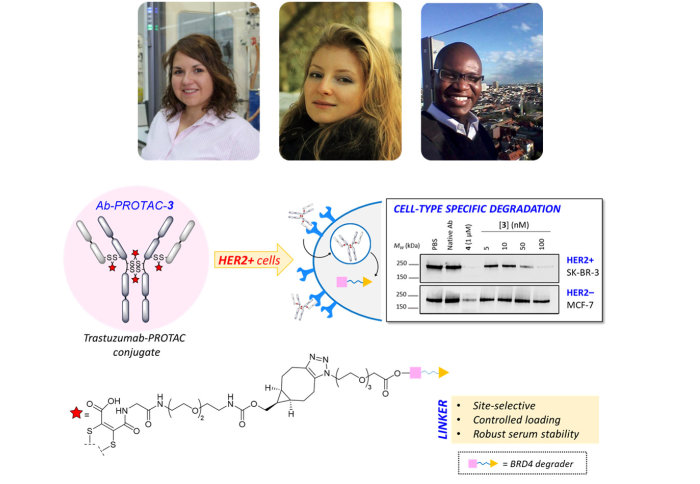A new antibody-PROTAC combination can selectively target Breast Cancer cells

A new antibody-PROTAC combination can selectively target Breast Cancer cells, and then degrade the protein inside
The new research published in ACS Chemical Biology is a collaborative effort between the Tate group at the MSRH, including Dr María Maneiro, Dr Maria Shchepinova and Cyrille Koundé, and the Baker group at University College London.
PROTACs are chemical biological tools that are used to degrade specific proteins within human cells, and the field of their study is currently thriving. Researchers are seeking new ways to employ these tools to the greatest effect, and the new combined study shows a pathway to using antibodies to direct the delivery of PROTACs to a specific tissue.
Certain types of Breast Cancer have an abundance of cell surface receptors called HER2. These cancer subsets are considered HER2 positive (HER2+). In this study the researchers used a PROTAC conjugated to the HER2 binding monoclonal antibody Trastuzumab. The team found that their new PROTAC conjugate did selectively target HER2+ cells, and upon entry into the cells it could be activated to successfully degrade a target protein. These experiments demonstrated the powerful potential of combining antibody-based targeting with the efficiency of PROTAC protein degradation.
Dr Maneiro was supported by the Xunta de Galicia with Postdoctoral Fellowship funding, and the study was funded by EPSRC and GlaxoSmithKline Research and Development Ltd.
Article text (excluding photos or graphics) © Imperial College London.
Photos and graphics subject to third party copyright used with permission or © Imperial College London.
Reporter
Dr Ravi Singh
Department of Chemistry
Edward Bartlett
Department of Chemistry